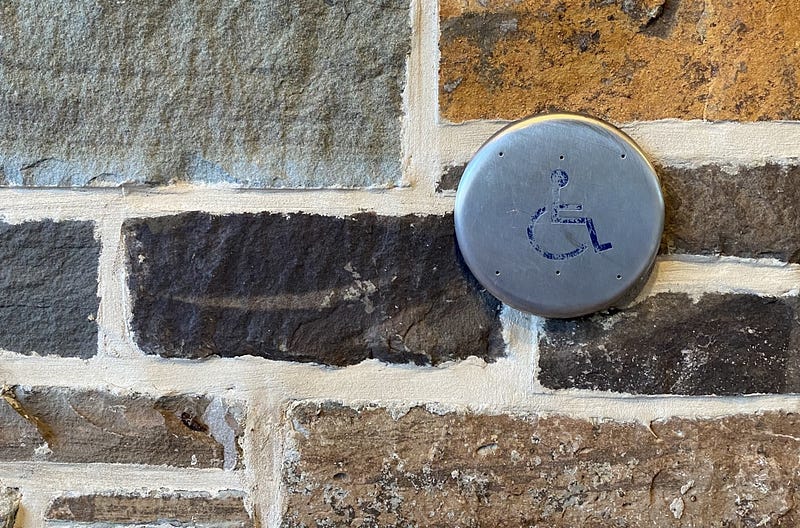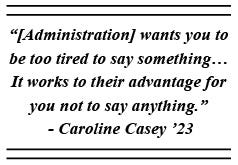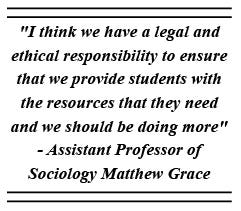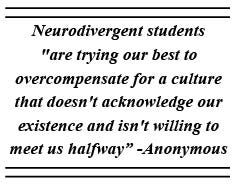
*Disclamer: Sorensen currently serves as the President of the Disabled Students’ Network*
When Caroline Casey ’23 arrived at Hamilton, she never expected that her poetry class would be “the worst academic experience” of her life. “I had taken a poetry class my senior year of high school and absolutely loved it and found a lot of success…So I was really excited about the course.” It was a 200 level class, and she expected it to be difficult, but she was planning to major in literature and felt prepared.
In high school, Casey was diagnosed with dyslexia and slow processing disorder, so she was aware of some of the challenges she might face in the course. “I found in high school that I can’t hear rhymes and syllables as a result of how my brain processes language…I can’t participate in that aspect of analyzing poetry, but I am successful in other aspects of it,” said Casey. Hoping to face these challenges head on, she met with the professor, who was also her advisor, to ask for support. “I explained that I’m dyslexic…and I asked [the professor] if I’d be able to take the course…I ended up getting quizzed on what it means to be dyslexic, [the professor] was challenging me about what I was saying.” Casey claims her professor told her, “if you just worked harder, this wouldn’t be an issue.”
She spent the rest of the semester feeling belittled and beaten down by her professor. “I was continually singled out for the rest of the semester…[the professor] asked me to rewrite every single paper multiple times.” The experience shook her: “it was truly a traumatizing experience, it absolutely paralyzed me in terms of writing…It felt like [the professor] wanted to prove…that I didn’t have a learning disability.”
For students like Casey, accommodations such as extended and distraction-free testing, attendance flexibility and the ability to record lectures level the academic playing field. These academic accommodations are meant to provide students with disabilities access to equal academic opportunities and are one of the many ways federal law requires colleges and universities to be accessible to all. At the beginning of each semester, students with accommodations and their faculty receive emails from Dean Allen Harrison, the Assistant Dean of Students for International Students and Accessibility, documenting each students’ academic accommodations.
The Americans with Disabilities Act of 1990 (ADA) and Section 504 of the Rehabilitation Act of 1973, guarantees students with documented disabilities reasonable accommodations in order to protect them from discrimination. Reasonable accommodations also include providing students with a physically accessible classroom.
The five students interviewed by
The Spectator
described significant and frequent difficulty with receiving their accommodations from professors. Both students and faculty pointed to the need for additional faculty training to improve the experiences of students with disabilities, particularly because faculty do not currently receive any training on disability, accommodations or academic accessibility. There are considerable expenses involved in receiving the medical documentation required by the College to obtain accommodations. The need for this documentation, which may include psychoeducational evaluations, places significant hurdles in front of students who may need accommodations but lack the resources.
While these challenges create barriers for students currently enrolled at Hamilton, the physical construction of Hamilton’s campus, where most academic and residential buildings are not wheelchair accessible, likely prevents many individuals with disabilities from applying to Hamilton in the first place.

Physical Accessibility
This year, Hamilton completed the $3 million dollar renovation of the Chapel’s steeple, the logo of the College. The Chapel is a physically inaccessible building: other than the aisle, it lacks accessible restrooms and places for wheelchair users to go. “It is not compliant in any real sense of the word,” College Chaplain Jeffrey McArn noted. Though the renovation did not include any changes to the interior of the building, its price tag raises questions about how else the money could have been spent.
“I love the Chapel, obviously,” said McArn. “But would it be the worst thing in the world if the steeple was just cut off where the structural instabilities were and used that money for accessibility? I would’ve thought that’s a pretty good trade-off.” For McArn, the focus on the historical accuracy of the renovation is indicative of the College’s priorities. “The attention paid to…‘what was the original color? Was it a copper roof, or was it slate? Let’s try to replicate it.’ It’s pretty clear that there’s a pretty high premium on that kind of history and aesthetics, but I haven’t seen that same attention to accessibility…It’s a little bit of a sign that it’s not, institutionally or culturally, to the level of awareness or high enough priority to be like, we’re going to address it,” noted McArn.
“Have you ever seen a student in a wheelchair?” asked Jackie Prunier ’23, when questioned about the College’s accessibility. Helen Ziobrowski ’24, the Vice President of the Disabled Students’ Network, described how campus inaccessibility leaves her feeling conflicted about the College. “I don’t want to badmouth the school because I do love it here. I love Hamilton. I should be allowed to come here and… it’s heartbreaking to me that if a student in a wheelchair wanted to come here, how would they do it? Where would they live?” said Ziobrowski.
Assistant Director of Residential Life Tanith Sherman noted over email that “We have several residence halls on campus that are partially accessible…additionally, Skenandoa is accessible on all floors.” These residence halls, which include Kirkland, North, South, Ferguson, Carnegie and others, “all have entrances that are wheelchair accessible” she said.
Sherman continued, “we have transportation options for students with mobility issues, which allows them to be picked up at their residence and driven to…other location[s] on campus…we work very hard to ensure that students with documented needs are able to live successfully in our residence halls.”
Ziobrowski does not believe this is enough. “It is down the Hill,” she said, referring to Skenandoa. “It is not functionally accessible even if it is meeting the definition of accessibility. This campus is not functionally accessible…[for] physically disabled students.”
The lack of accessibility “sends a message,” said McArn, “that we’ll do whatever we are going to with whoever can access the space, and it’s an exclusionary space.” For Ziobrowski, the message is saying “we don’t care if disabled students come here or not.” Prunier agrees: “becoming disabled can happen to literally anyone at any time, even if you break your leg and you’re disabled for eight weeks, imagine walking around this campus on crutches…it seems like it isn’t a concern of the administration.”
“An Issue of Class and Privilege”: Obtaining Academic Accommodations
Students who believe they need academic accommodations must submit documentation of their disability, including the diagnosis, nature of the disability and specific accommodations needed, in addition to supporting paperwork from their physician. Students with learning disabilities or Attention Deficit Disorder must include a psychoeducational evaluation administered within three years of enrollment. In addition to allowing students to obtain accommodations, receiving a diagnosis can be an empowering and personally significant experience. For Casey, “being able to put a name to something you struggle with and recognize that it isn’t your fault but rather just part of who you are is incredibly empowering…understanding that my brain works differently completely changed the way I felt about myself and my academic ability.”
“Being able to get accommodations letters is also an issue of class and privilege, of having access to doctors who can say ‘you have this diagnosis,’”Assistant Professor of Women’s and Gender Studies Stina Soderling explained. “If we only privilege the students who have been able to navigate the system in certain ways, we end up perpetuating the systems of inequality that are already here.”
Chair and Professor of Economics Ann Owen voiced a similar perspective, “I have a concern about, if there’s an expense involved in getting the accommodation, whether all students have access to the means of getting an accommodation…So many of these accommodations are related to evaluation and grading, it seems that that’s not fair…not fair for the students who should have an accommodation and don’t get one.”
Professor Owen said “if there’s some obstacle to getting the accommodation that some students can’t cross because they’re from a lower income… that’s not fair…because so many of them are about and relate to the grade that a student gets.”
Assistant Professor of Sociology Matthew Grace agreed, arguing that “as a well-resourced institution, we should provide access to those services. Especially if our intention is to create an inclusive environment for all students and one that’s centered on equity, then it’s only reasonable to expect that we should be able to utilize the vast resources that we have available to have students tested who need it who previously were lacking in access.”
Dean Harrison declined to provide a comment on the average cost of psychoeducational evaluations, the providers to whom he typically refers students or the frequency at which the College provides financial assistance to students in need, noting only that “financial aid assistance to pay for evaluations may be available.”
The Spectator
reached out to psychologists in the area who provide psychoeducational evaluations in order to get a sense of the typical costs associated with obtaining these evaluations. Dr. Brad Bennett, PhD, a psychologist at Clinton Therapy and Testing Center, shared that psychoeducational evaluations for college students typically take between four and 10 hours, and he charges a rate of $130/hour, for a total of between $500 and $1,300. Evaluations for learning disabilities tend to take a total of six hours, he said, including testing, scoring and writing up the evaluation for a total of about $800 at his office. Dr. Bennett noted that his fees are on the lower end for the region, and that some providers charge as much as $2500 for psychoeducational evaluations in this area.
Dr. Danielle Bronk, PhD, a psychologist at Neurodevelopmental Health Services in Utica, described similar fees as Dr. Bennett, noting that psychoeducational evaluations at her practice generally take between eight and 10 hours and typically range in cost from $1000 to $1500. Dr. Bronk stated that neuropsychological evaluations, which may also be used to assess an individual’s need for academic accommodations, typically cost a minimum of $2500. Neurodevelopmental Health Services’ website notes that “most health insurance companies will not pay for psychological or neuropsychological evaluations that address primarily academic, educational, or legal concerns.”
Faculty have different approaches for supporting students who assert a need for accommodations but lack official documentation. Professor Soderling described how when students without documentation request an accommodation, “I tend to approach it the same way as if someone has a letter…I don’t think it’s my place to say, ‘nah, you don’t have that need.’”
For other professors, this may be more difficult. Professor Owen noted that because the majority of accommodations are for extended time on exams, she tries “to give everybody plenty of time.” Professor Owen continued, “hopefully that at least addresses that partially…but I don’t feel like I would be very qualified if a student came to me and said, ‘I think that I have a need for an accommodation, but I don’t have the official paperwork.’ I don’t know how I would evaluate that.”

Faculty Refusals to Provide Accommodations
Students interviewed for this piece described how impactful academic accommodations can be. “[Extended testing time] changed pretty much my entire experience with testing…I didn’t realize that the hardest part of a test shouldn’t be the time,” Casey said. Keshav Rai ’23 has found a similar benefit from that accommodation, “It’s hard for people without ADHD to understand…I have an attention span of maybe a minute…But with time and a half, it has helped me with being able to slow down and think about the work I’m doing. And if I zone in and out, that’s fine.”
Although federal law requires Hamilton to provide students who have documented disabilities with reasonable accommodations, actually receiving this support depends largely on professors’ willingness to provide them.
Rai, a neurodivergent student whose accommodations include permission to record lectures, described how receiving that accommodation “is very much dependent on how comfortable the professor is with [providing] it.” Rai has struggled to navigate these situations. “I can’t just say, ‘no, you have to give me this accommodation’ because you don’t want to get in the bad graces of your professor who is going to be grading you for a semester, [so] you kind of have to work around it.”
Professor Owen explained that some faculty discomfort with lecture recordings may arise because “there are some people that are teaching sensitive topics and things get taken out of context. And that comes back to hurt faculty at some point. So I think people are generally concerned about somebody recording their classes. I also think it’s possible that if the other students knew that they were being recorded, that it could affect their willingness to participate.”

Ziobrowski, who has a degenerative joint condition and receives screen-related accommodations due to a series of concussions, has faced similar challenges receiving her accommodations from faculty. Ziobrowski’s accommodations are supposed to guarantee her printed copies of all course materials because she cannot use computers for extended periods of time. Her math professor refused to print out the online homeworks for her. “He didn’t want to print them out, so it was just like, ‘you don’t have to do it.’”
She continued, “Could I have insisted that he [print] the homework? Yes.” When asked if that should be her responsibility, she said “No, I don’t think so…It’s one of those things where obviously if you tell me I don’t have to do the homework, I’m not going to beg you to make me do the homework…[But] then I’m kind of robbed of that resource, which [the professor] thinks is necessary for the course, for all other students…So, what’s the deal with that?” In Ziobrowski’s experience, professors often forget to send her documents to the print shop, “It is so frustrating to have to ask professors for accommodations literally every single time, like, let me send an email and have to wait two business days for a reply.”
In other cases, provided accommodations may not adequately meet students’ needs. Casey relies on audiobooks to complete her readings, but has found that audio recordings of her readings are not consistently available. She noted, “I’ll tell professors that there isn’t an audiobook and I can’t do [the reading] and they’ll be like, ‘Okay, well try your best!’…It tells you how little people consider disability.”
Casey explained that while Dean Harrison’s office has tried to alleviate this challenge by providing students with access to text-to-voice transcription software, “it’s literally like a robot speaking, and that’s not helpful to me at all.” Later in the interview, Casey asked “we have notetakers, why don’t we also have somebody in classes who could record themselves doing the readings?…That could be such an easy solution.”
Faculty refusals to provide accommodations turned some students interviewed by
The Spectator
away from entire departments. Prunier struggled when a professor, the chair of the department, refused to provide an extension, an accommodation deemed necessary for Prunier by the Dean of Students office. Prunier, who had four concussions that year alone, was sleeping 13 hours a day at the time and was unable to finish the work by the deadline. She did not feel like Dean Harrison could provide her with help either. “She’s the head of the department, who’s even above her to really tell her what to do?” Prunier continued, “She’s supposed to represent the department…I knew I was going to need accommodations in the future, so I was like, this is not the path for me.”
In other cases, students felt that they were unable to take certain classes, not because the material was inaccessible to them, but because fighting for their accommodations would be too difficult. Ziobrowski explained, “Could I, for example, take a computer science class? Can they legally say, ‘No, you can’t’? No. Can they make it difficult enough for me where I don’t want to put in the energy to figure it out so I’m not going to even bother signing up for a computer science class? Yeah.”
Ziobrowski asserted that this process works to the benefit of the College. “It’s just easier for them at the end of the day,” Ziobrowski explained. “They don’t have to do as much work… It leaves it on me to figure out solutions. It makes it so that they don’t have to change what they’re doing now.” Casey echoed that sentiment, “[Administration] wants you to be too tired to say something, like whether it’s on purpose or not, those people who need to say something are the most tired, students with learning disabilities are already the most tired…It works to their advantage for you not to say anything.”

A Lack of Faculty Training and Support
Professors Grace, Soderling and Owen all noted that the College does not require faculty to receive training on accessibility, accommodations or disability, other than what Professor Soderling described as “a half-hour panel during new faculty orientation that was Dean Harrison and a few students saying that the office was there.” Prunier argued that the accommodations process “looks good on paper, but the professors need more training.”
Professor Grace agreed with the need for more training, arguing that it could help create “more consistency in terms of [faculty] understanding of what is the obligation of an instructor.” Soderling similarly asserted that “it would be great to have questions of accessibility be part of new faculty orientation,” though she worried that “the College’s approach is very much to add more things on [to new faculty orientation] to already overburdened faculty.”
Professor Grace, in response to the concern that faculty are already overburdened with trainings, described how training on disability is important enough to make it mandatory. “I think that this is one of those areas that’s so important that this shouldn’t be the thing that would be one step too far…I think we have a legal and ethical responsibility to ensure that we provide students with the resources that they need and we should be doing more.”
All of the students interviewed by
The Spectator
articulated a need for further faculty training. For Ziobrowski, “even just sensitivity training” would be beneficial. She explained, “My accommodations aren’t the most common, especially in terms of printing stuff out. Having them be aware that it’s their responsibility and this is part of the job description… making them aware immediately, like when they become professors, that this is part of the job, part of being a professor is providing these accommodations.
Similarly, Casey believes that training faculty could help rebuild her trust in the professors at Hamilton. “I think I don’t have that much trust in the knowledge of the faculty here about students with learning disabilities…I just don’t trust the knowledge base because I haven’t seen it.” She continued, “You can’t just accept somebody [who is neurodivergent] and be like ‘good luck,’ there has to be an active choice to educate professors and to push for acceptance.”
Another student, who wished to remain anonymous, described how his professor “infantilized me and talked down to me,” after he disclosed that he is autistic. “I lost trust in professors [after that],” he said. He also indicated that faculty training is necessary. “[Faculty] definitely need at least some kind of training on neurodiversity.”
In Rai’s opinion, faculty knowledge about ADHD “is very inconsistent.” He described feeling like his professors do not always believe his diagnosis, and claimed that one of his professors, whenever he brought up having ADHD, would say “‘I met a student who claimed to be facing these issues, but I’ve always wondered about the legitimacy of what they said.”’ Rai continued, claiming that “and then after two seconds, the professor would say, ‘but not you, I’m not talking about you.’ And I was always confused, because then, why would you always bring it up?”
For Rai, this lack of knowledge and sensitivity is quite frustrating and can have detriments for academic success. “I don’t need a professor to sympathize with me…I’d rather they were able to understand a little bit about how I function relative to the average student so that we can think about solutions.” Professor Owen echoed the need for improved dialogue between students and faculty. “I don’t have the training to completely understand a person’s disability. But if you told me, ‘okay, here’s my need,’ we could think about ways of […] meeting that need.”
There has been “considerable growth in the numbers of students who request academic accommodations,” Dean Harrison noted over email. Professor Owen described how this increases the burden placed on faculty. “When I first started [teaching at Hamilton]…you’d have, in a class of 80 students, one, three students with extra time…And now, [it is] rare to have such a small fraction of your classes, and the accommodations are also more complex.”
Professor Owen also described feeling like the College fails to provide faculty with the help they need to support students and provide accommodations. “You’re just kind of thrown a bunch of accommodations and they are like, here, you figure out how to do it for these students who all have varying accommodations,” she said. Professor Owen noted that the Dean of Students office “provides some assistance with scheduling rooms and finding a proctor,” but that the rest is left to faculty.
Professor Owen asserted that the current lack of support overwhelms faculty. “I think most faculty want to do what is necessary to help a student learn, but sometimes the number of students that have accommodations is overwhelming because they don’t all have the same accommodations. Right now, I have 14 students this semester that have accommodations. Very few of them have exactly the same accommodation. So it’s not like I can figure out, ‘oh, well, here’s what I’m doing in this situation’ and just do it for all 14 of them. They all have different accommodations.”
In an effort to address this challenge, Owen decided that the Economics Department will create its own testing center for finals this semester, “because for each individual faculty member to make these arrangements, it’s a decent amount of work…And to me, it’s like, if I can do that, I don’t understand why the College can’t.”
Moreover, the increasing complexity of accommodations can make it difficult for faculty to know how to adapt the coursework and teaching style. “Sometimes it’s hard to implement [non-standard accommodations] given how you’re trying to teach a class, and so it would be nice to be consulted about whether or not [these accommodations] are the best way to meet the students’ needs,” Owen said.
In order to protect the privacy of students, Dean Harrison’s office does not provide faculty with information about students’ diagnoses or the specific circumstances of their disability. Professor Owen highlighted the importance of this, noting that “I don’t think we need that level of information about each individual student,” but voiced concerns about how the lack of context about a student’s needs may hurt their academic experience. “If I have a concern about how a specific accommodation might affect a student’s learning…it seems like everybody would be better off if we could have a conversation about, is there an alternative way of meeting this student’s need, that’s not this very specific thing.” Owen continued, “It’s always easier to do something when you understand why you’re doing it.”
Dean Harrison stated over email that “we surveyed the faculty to gain a better understanding of the climate around disability, to measure their attitudes and knowledge and to find out where there is a need for training and in what format(s) the training should occur. Currently, analysis of the data is taking place with the hope that findings will be shared with the campus community very soon.”

A Way Forward: Disability as Diversity
For Ziobrowski, the College’s lack of consideration for issues of disability and accessibility makes those topics difficult to talk about. “I’m a tour guide now, and it’s like, what would I say to a student that was disabled and was asking about accommodations…I wouldn’t know what to tell a student who toured here and asked me that. I would not have much positive feedback to give on disability here.”
Other students also described feeling conflicted about their experiences at Hamilton. For Casey, her experience that first semester is tempered, to a degree, by her relationships with supportive and encouraging faculty. When Casey disclosed to her current academic advisor what happened in her poetry class, she was met with such support and validation that she was brought to tears. “She talked about the student I am…picking out the specific ways in which I really contribute to a class and my strengths as a student…to have a professor support you like that is truly unmatched…for a teacher to say, ‘I see you, and I see your value as a human being and as a thinker’…I’ll always remember that conversation.”
The students interviewed for this article expressed hopes for the future of Hamilton. Casey, for one, hopes that increased conversation about disability will lead people to begin talking to their friends about disability. “I hope people read this article and go start asking questions of their friends like, ‘how do you learn?’”
“I think that there should be some part of Student Assembly that focuses on this…There’s no dialogue about this…it shouldn’t just be that students have their own Disabled Students’ Network, this is something that should be done together,” Prunier said.
The student who wished to remain anonymous said that neurodivergent students “are trying our best to overcompensate for a culture that doesn’t acknowledge our existence and isn’t willing to meet us halfway.” All student interviewees expressed the desire to be met halfway by the Hamilton Community.
Ziobrowski hopes that the College will begin to view disability as part of diversity, “If this campus values diversity as much as they say we do…why are we not wheelchair accessible?…What does that say about Hamilton?” McArn echoed that sentiment and described his belief that solving these problems will require a community-wide effort, “It’s my hope for Hamilton College that we would become more of a community that is committed to taking care of each other and to have that reflected in these questions of diversity and accessibility.”

















